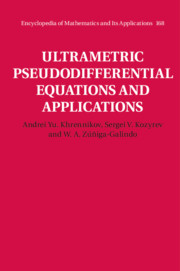Book contents
- Frontmatter
- Dedication
- Contents
- Preface
- 1 p-Adic Analysis: Essential Ideas and Results
- 2 Ultrametric Geometry: Cluster Networks and Buildings
- 3 p-Adic Wavelets
- 4 Ultrametricity in the Theory of Complex Systems
- 5 Some Applications of Wavelets and Integral Operators
- 6 p-Adic and Ultrametric Models in Geophysics
- 7 Recent Development of the Theory of p-Adic Dynamical Systems
- 8 Parabolic-Type Equations, Markov Processes, and Models of Complex Hierarchical Systems
- 9 Stochastic Heat Equation Driven by Gaussian Noise
- 10 Sobolev-Type Spaces and Pseudodifferential Operators
- 11 Non-Archimedean White Noise, Pseudodifferential Stochastic Equations, and Massive Euclidean Fields
- 12 Heat Traces and Spectral Zeta Functions for p-Adic Laplacians
- References
- Index
10 - Sobolev-Type Spaces and Pseudodifferential Operators
Published online by Cambridge University Press: 10 May 2018
- Frontmatter
- Dedication
- Contents
- Preface
- 1 p-Adic Analysis: Essential Ideas and Results
- 2 Ultrametric Geometry: Cluster Networks and Buildings
- 3 p-Adic Wavelets
- 4 Ultrametricity in the Theory of Complex Systems
- 5 Some Applications of Wavelets and Integral Operators
- 6 p-Adic and Ultrametric Models in Geophysics
- 7 Recent Development of the Theory of p-Adic Dynamical Systems
- 8 Parabolic-Type Equations, Markov Processes, and Models of Complex Hierarchical Systems
- 9 Stochastic Heat Equation Driven by Gaussian Noise
- 10 Sobolev-Type Spaces and Pseudodifferential Operators
- 11 Non-Archimedean White Noise, Pseudodifferential Stochastic Equations, and Massive Euclidean Fields
- 12 Heat Traces and Spectral Zeta Functions for p-Adic Laplacians
- References
- Index
Summary
Introduction
This chapter aims to present the basic results about Sobolev-type spaces over QNp and to show the existence of fundamental solutions for pseudodifferential equations over these spaces. We consider two types of spaces, denoted H∞ and W∞. Both of these spaces are countably Hilbert nuclear spaces, withW∞ continuously embedded in W∞. These spaces are invariant under the action of a large class of pseudodifferential operators. The spaces H∞ were studied by Zuniga-Galindo in [472]. These are locally convex spaces constructed from D by using a countable family of Hilbertian seminorms, see Section 10.2. The spaces W∞ were introduced in [473]. These are locally convex spaces constructed from a Lizorkin-type space of test functions by using a countable family of Hilbertian seminorms, see Section 10.4. In the spacesW∞ we show the existence of fundamental solutions for pseudodifferential equations of type, see Section 10.6. This result is valid in non-Archimedean local fields of arbitrary characteristic, for instance in Fp((t)). This result is the non-Archimedean counterpart of Hormander's solution of the problem of the division of a distribution by a polynomial, see [202], [316]. The key ingredient is a non-Archimedean version of the Hormander–Łojasiewicz inequality developed in Section 10.3. In [404, Theorems 4.1 and 4.2], Taylor, Varadarajan, Virtanen, and Weisbart also proved this inequality. The rest of the chapter is dedicated to connections between local zeta functions and fundamental solutions. In the Archimedean setting, the local zeta functions were introduced in the 1950s by Gel'fand and Shilov. The main motivation was that the meromorphic continuation of Archimedean local zeta functions implies the existence of fundamental solutions for differential operators with constant coefficients. This result has a non-Archimedean counterpart. In [462], see also [470] and the references therein, Zuniga-Galindo noticed that the classical argument showing that the analytic continuation of local zeta functions implies the existence of fundamental solutions also works in non-Archimedean fields of characteristic zero, and that for particular polynomials the Gel'fand–Shilov method gives explicit formulae for fundamental solutions. We review these ideas in Section 10.7, without proofs.
- Type
- Chapter
- Information
- Ultrametric Pseudodifferential Equations and Applications , pp. 155 - 176Publisher: Cambridge University PressPrint publication year: 2018



